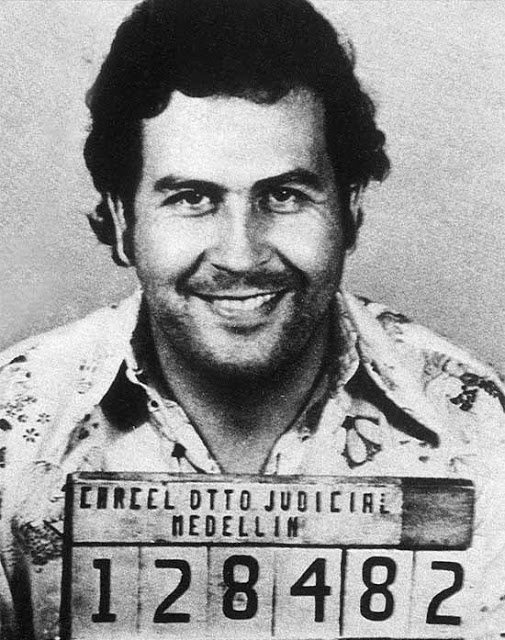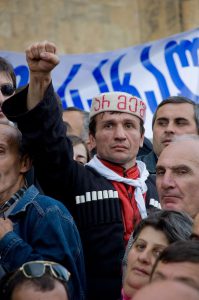Winner of the Fall 2018 StMU History Media Award for
Best Article in the Category of “International Studies”
Drugs, money, girls, power. That’s what a majority of people think of when they hear of Pablo Escobar. Many have heard of Escobar through stories and articles, but what people don’t understand is how he became the person he did and what struggles led to his ultimate defeat. To truly understand how Pablo Escobar became the person he was, his family background, economic stability, and financial struggles have to be taken into consideration.

Pablo Escobar was born in Rionegro, Colombia where he developed his criminal mindset at an early age. His family was unable to support him and his siblings financially, so he took matters into his own hands. He started with minuscule crimes such as grave robbing and car hijacking. However, these crimes did not satisfy his desire for more power and respect. He escalated to smuggling and trading business for cigarettes, but then later ended up working for Fabio Restrepo, one of the most respected drug traffickers of his time. Escobar worked under his wing, and quickly learned and retained everything that Fabio taught him. He became his “right hand man,” but that wasn’t enough for Escobar. His power hunger grew so much that he ended up killing Fabio in 1975, and immediately he took over all of his operations and expanded an empire that took the world by a storm.1
As fun as Escobar’s drug empire was, he knew he could not continue to take the throne without getting involved in the political world. Escobar’s dream since he was a young kid was to become the president of Colombia. Every little kid’s dream is to become the president or an astronaut, but to Escobar, this wasn’t a dream, it was going to be his reality. But first, he had to start small to build himself up to his dream. Escobar knew that in order to continue his business and even have a shot of becoming a political leader in Colombia, he had to gain the hearts of the people. And what better way to do this than to go back to the community he was raised in. Escobar knew this was going to gain him a big advantage in the political world when he decided to give back to his own people. Pablo helped construct new houses, pools and stores for the community. He also gave his money away to citizens throughout the community to help people who were financially unstable. Escobar’s most famous “robin hood” act was building a new recreational center for the community. The old recreation center had been destroyed over time and was never kept up, and the community didn’t have the money to fix it. Pablo revamped the recreation center, and this was what really captured the hearts of the people. He was glorified as a saint by the whole community and people worshipped him for everything he did. He was one of their own, someone who came from nothing, but became something big.2
With Escobar being so powerful and impactful, he had to be very persuasive in order to get his way. He would bribe numerous powerful people to get what he wanted, no matter the cost. Escobar had a saying, “Plata o plomo,” meaning, silver or lead.3 This helped describe the kind of influence he had with people. If he didn’t get what he wanted with bribery, he would respond with a retaliation or even death. Instilling fear into people was how he gained the respect he craved. He wanted people to know who he was and to not cross him, or else they would have to deal with the consequences. Soon, Escobar’s hunger for respect turned into a loss of humanity. Escobar was so determined to expand his business that he did not know any limits. Assassinations, suicide, death were all apart of the game to Escobar in order to obtain the bigger picture.4
Escobar killed thousands of innocent people in order to be the kingpin of drug distribution. He would orchestrate bombings, assassinations, and even conduct “drive-bys.” It did not matter who the person was, whether they have a family or kids, Escobar killed to get what he wanted. He conducted numerous assassinations on political leaders, journalists, and even citizens who disagreed or did not contribute to his cause. Escobar knew that his shot at becoming the president of Columbia was not going to happen after he started killing political forces in the government, and also the United States was quickly closing in on Escobar trying to arrest him. He used his rage in retaliation to his enemies, hoping this would help influence the Columbian government. Escobar’s main goal on his agenda was a no-extradition clause and amnesty for drug barons in exchange for giving up the trade. Escobar’s “blacklist” claimed the lives of three Colombian presidential candidates, an attorney general, judges and more than 1,000 police officers. In addition, Escobar was implicated as the mastermind behind the bombing of a Colombian jetliner in 1989 that killed more than 100 people. Escobar’s murder binge eventually turned the public opinion against him and caused a breakup of the alliance of drug traffickers known as The Medellin Cartel.5

Soon after all of Escobar’s affairs started going down the drain, Escobar surrendered to Cesar Gaviria, the President of Columbia. But Escobar wanted something in return. The extradition was lifted, and Escobar was allowed to build his own prison called “La Catedral,” which was guarded by people Escobar handpicked. This allowed Escobar to control everything that happened from inside the prison. Although this was not the ideal “capture” the government wanted along with the United States, which at the time, was going to be their best bet. Escobar could control his entire business by smuggling people, drugs, items, foods, and guns to build his “home away from home.” Escobar had a casino, spa, and nightclub built into his so-called prison. As much as Escobar liked the fact that he was able to construct his own prison with his own security and within whatever parameters he wanted, this was once again not enough for him. He wanted to be free to get back to his empire. To escape, Escobar needed a plan.6
The United States and the Columbian government got wind of Escobar’s plans to escape, so they retaliated against him. They surrounded the compound to try to cover up all of the entrances, but this didn’t stop Escobar. First, they made there way through the main entrance thinking this would block off any and all “escape routes.” But in reality, Escobar hoped they would do this. While they were all coming through the front, Escobar made his way through a secret entrance that he built for this specific situation. All of his guards were having a gun fight outside and throughout the Castle while Escobar was making his infamous “get away.” Escobar escaped into the forest where he fled from the authorities, even though his escape was already planned for another day. It helped that even though there was a snitch inside the prison, there was also one outside that alerted Escobar the authorities were approaching the castle, enabling him to escape when the time was right. The manhunt for the drug lord Pablo Escobar lasted almost a year and a half. The authorities occasionally got tips on Escobar’s location, but these were all false sightings that led to dead ends. Escobar had to be very careful while on the run. But in the end, the law caught up to him. On this fateful day, he had tried to escape, but the police got wind of it. The police pursued this tip, and they ended up closing in on his location. He tried to run through the neighborhood, but he ended up being shot in a shootout, and this is how the reign of Pablo Escobar came to a quick end on December 2, 19937

Escobar even to this day, despite all of the horrible and inhumane acts he committed, is considered a saint for everything he gave to the community. Drug dealer or not, he gave back to his people which left a lasting impression not only in their hearts but in their minds. His actions will never be forgotten by people all around the world. So the question is: Is Pablo Escobar a robin hood or murderer? That’s for you to decide.
- “Pablo Escobar,” Biography.com, December 14, 2017, https://www.biography.com/people/pablo-escobar-9542497. ↵
- Christopher Minster, “Learn the Story of Ruthless Drug Kingpin, Pablo Escobar,” ThoughtCo, https://www.thoughtco.com/biography-of-pablo-escobar-2136126. ↵
- Amy Tikkanen, “Pablo Escobar,” Encyclopædia Britannica, March 08, 2016, https://www.britannica.com/biography/Pablo-Escobar. ↵
- Christopher Minster, “Learn the Story of Ruthless Drug Kingpin, Pablo Escobar,” ThoughtCo, https://www.thoughtco.com/biography-of-pablo-escobar-2136126. ↵
- “Pablo Escobar,” The Free Dictionary, https://encyclopedia.thefreedictionary.com/pabloescobar. ↵
- Steven Ambrus, “Colombia Drug Lord Escobar Dies in Shootout,” Los Angeles Times, December 03, 1993, http://articles.latimes.com/1993-12-03/news/mn-63509_1_pablo-escobar. ↵
- Steven Ambrus, “Colombia Drug Lord Escobar Dies in Shootout,” Los Angeles Times, December 03, 1993, http://articles.latimes.com/1993-12-03/news/mn-63509_1_pablo-escobar. ↵



142 comments
Aracely Ortiz Soriano
I always find it so interesting when the origins of villains are stated and we get to know more about what compelled them to take the actions they took. Although his actions are not justified, I think it is important that this article noted how Escobar gave back to his community, for living in a first-world country often leaves us oblivious to the struggles other countries with lesser resources go through. I think one should also remember that we can’t control the dreams we have, and with Escobar’s unquenchable ambition which was probably fueled by his humble origins, it is easy to see how easily it was for him to deviate from the right thing to do and how once he had his drug empire set up, how hard it must’ve been to stop.
Rebeca Escobar
Many people are quick to demonize the cartels and drug lords, most especially Pablo Escobar. I don’t want to condone his actions or justify them, but I think many of us share the drive and goals he had in mind. He came from nothing and simply wanted more for himself and his family. Maybe he had good intentions initially; he wanted to support himself, his family, and his community. I think it’s a case of letting power and money get to your head, and eventually craving something more than charity. He definitely started off as Robin Hood, but would later escalate to a villainous drug lord who had lost his good intentions and heart on his way to the top.
Bianca-Rhae Jacquez
This article provides the two sides that the people of Colombia were able to see of Pablo Escobar. This article provided details about how he provided the community with homes and community centers and how he could be seen as a good man. It has been said that a bad man is not bad to everyone they meet and this article shows exactly this of Pablo Escobar.
Leonardo Gallegos
Interesting article! The media will always try to portray the worst out of a person like this. Although he committed many crimes, this article really makes me think of Pablo Escobar from a new perspective, he was a man who was taking care of his own people. The way he obtaining such a great amount of power wasn’t the most appropriate way but helping others also opens up a new page or a new perspective of the types of values that Escobar had.
Samantha Luckey
Congratulations on being nominated for your article! This article was extremely interesting and moving, as well as educational. It was able to provide historical details about the drug cartels. Overall the writing was well done, and this author was able to engage the reader to continue reading on, as well as, informing the reader of important details regarding the interesting life of Pablo Escobar. Great work!
Samire Adam
I love hearing a new perspective on the cartels and drug lords. The most society learns about them are from news reports, which never really go into depth about the effect they have in society as a person and not simply as a drug. The world is not simply black and white, but a vast range of shades of gray. The article is well written and puts a new spin on a topic that is tiptoed and danced around.
Alexandra Lopez
Reading about Pablo Escobar and how he gave back to the community in very important ways questions the reader whether he was good or bad. This article was well written and made me question on my true feeling on Pablo Escobar’s actions. Different opinions can be said about this but I believe on the reasoning behind an action determines whether you are good or bad. Escobar only gave back to gain political power and influence so I do not think he is a good guy but a manipulative individual. (reposted)
Natalie Juarez
I like how you did not demonize Pablo but simply shared his story in a way that showed that he was a human being who went through hellish situations. Yes, he did horrible and inhumane things, but he was not completely horrible since he gave back to his community. Power hunger can drive people to do horrible things the way it made Pablo, and you did a great job writing for the readers to get to understand him and where he came from.
Robert Rees
While I don’t condone his actions, I do understand while Pablo Escobar did the things that he did. Like any individual, Pablo Escobar wanted more for himself than what he was born with and he had a clear vision of how to do so. He committed crimes when he believed they were necessary to support his family, and continued down this path when he saw his power and wealth could grow the more he expanded his criminal activities. A criminal boss with great power and influences over both the people and other criminal enterprises that tried to become president, it’s almost like Pablo Escobar wanted to be like DC Comic’s Lex Luthor or Marvel’s Kingpin characters. Overall, this a wonder article deserving of its nomination.
Gabriel Dossey
I know families from mexico who fight with each other over whether he was a blessing or a curse. I think that you were able to capture this perspective of good and evil. I would say he was pretty bad. I think that this was an amazing article and hope you win your nominations. Thank you for this article. Good luck!